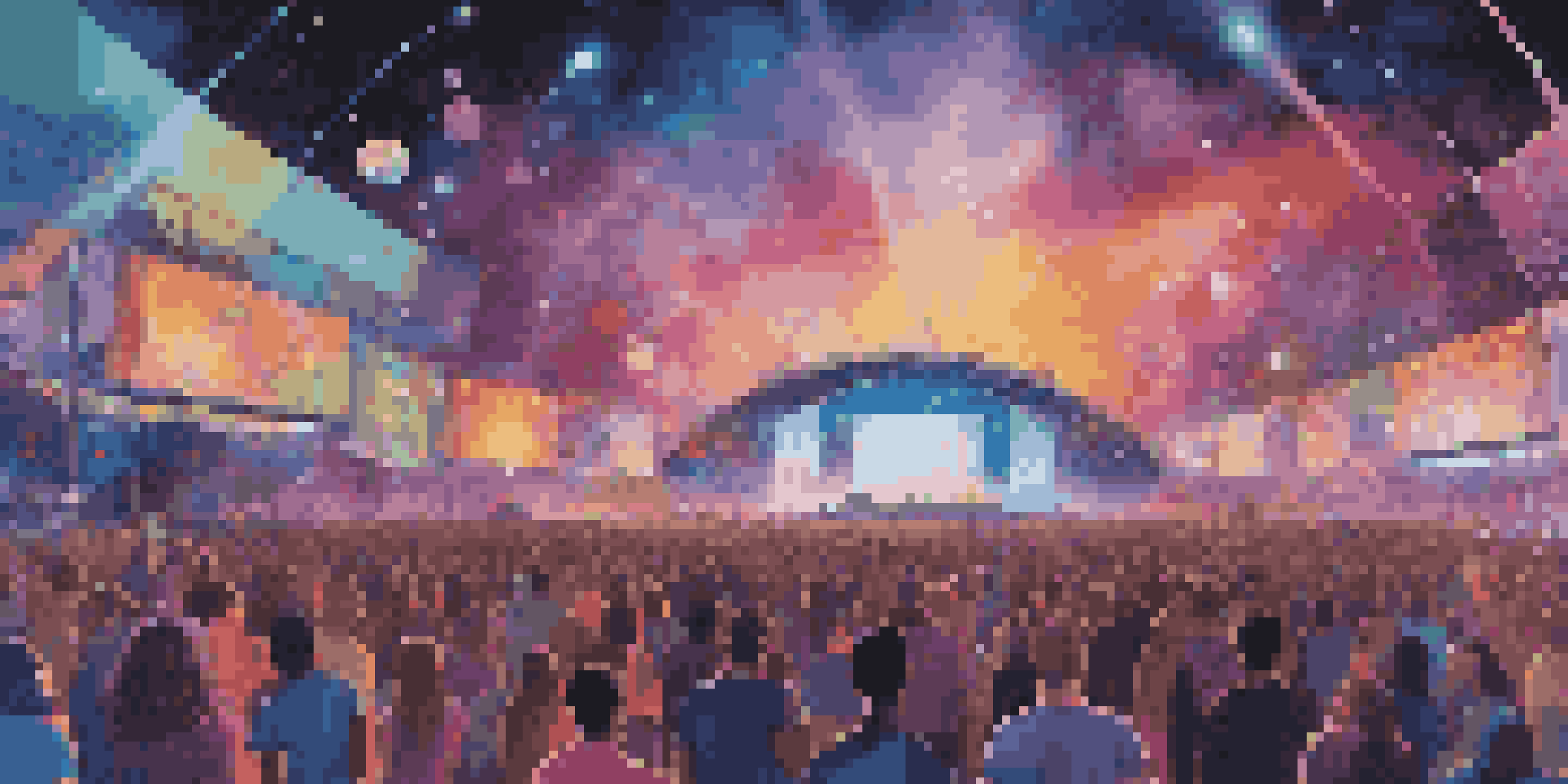How Blockchain is Revolutionizing the Music Industry Landscape

Understanding Blockchain: The Basics Explained
Blockchain is a decentralized digital ledger that records transactions across many computers securely. Imagine it as a digital notebook that everyone can see but no one can erase. This transparency is what makes it revolutionary, especially in industries like music, where ownership and royalties are often murky.
Blockchain is the technology that will help artists regain control over their music and their rights.
In simple terms, blockchain technology allows for the creation of a secure and transparent record of ownership. Each time a song is played or purchased, a new block is added to the chain, making it easy to trace who owns what and how much they should earn. This clarity can empower artists and reduce disputes over rights.
As artists and producers navigate this complex landscape, understanding blockchain can provide them with essential tools for managing their careers. By leveraging this technology, they can ensure fair compensation and maintain control over their creative works.
Empowering Artists with Direct Royalties
Traditionally, artists rely on intermediaries like record labels to distribute their music and manage royalties. This often leads to delayed payments and unfair splits of profits. Blockchain changes this by allowing direct transactions between artists and fans, ensuring that creators receive a larger share of the revenue.

Imagine purchasing a song and knowing that the artist receives every cent immediately. With blockchain, smart contracts can automate this process, ensuring fair compensation without the need for middlemen. This is a game changer for independent artists who want to retain control over their work.
Blockchain Empowers Artists Directly
Blockchain technology enables artists to receive direct payments from fans, ensuring fair compensation and eliminating the need for intermediaries.
By cutting out the middlemen, artists can also build a stronger connection with their audience. Fans can support them directly, creating a community that values their work. This shift not only benefits artists but enriches the overall music experience for listeners.
Enhancing Transparency in Music Rights Management
One of the biggest challenges in the music industry is tracking rights and royalties accurately. With multiple parties involved, disputes often arise over who owns what. Blockchain offers a solution by providing a single, immutable record of ownership that everyone can access.
The future of music is decentralized, and artists are finally taking back the power.
This transparency can significantly reduce legal disputes and create a more efficient system for managing rights. For example, if a song is sampled or covered, the blockchain can easily show who the original creator is and how royalties should be distributed. This clarity is crucial for maintaining trust in the industry.
As more artists and industry professionals adopt blockchain, we may see a shift toward a more equitable and transparent music ecosystem. This change could lead to a greater appreciation for artists' work and a more sustainable industry overall.
Revolutionizing Music Distribution through Decentralization
Decentralization is at the heart of blockchain technology, allowing artists to distribute their music without relying on traditional platforms. This means they can choose how and when to release their work, fostering creativity and innovation. In essence, artists can become their own distributors.
Platforms built on blockchain enable artists to share their music directly with fans, often leading to better profit margins. For example, artists can sell their music as non-fungible tokens (NFTs), creating unique digital assets that fans can buy, sell, or trade. This not only diversifies revenue streams but also adds a new layer of engagement.
Enhanced Transparency in Royalties
With blockchain's immutable records, tracking music rights and royalties becomes clearer, reducing disputes and fostering trust in the industry.
As this model gains traction, we may witness a shift away from conventional streaming services, giving artists more control over their distribution. This democratization of music distribution has the potential to reshape the industry landscape significantly.
Creating New Revenue Streams with NFTs
Non-fungible tokens, or NFTs, have taken the art world by storm, and the music industry is no exception. These unique digital assets allow artists to sell exclusive rights or experiences related to their music. Think of it as owning a limited-edition piece of art; it comes with a story and value that's unique to you.
By offering NFTs, musicians can tap into new revenue streams, whether through selling digital albums, concert tickets, or limited edition merchandise. This innovation not only enhances the fan experience but also enables artists to monetize their work in creative ways. It’s like turning a song into a collectible item.
As artists experiment with NFTs, we may see a new era of artist-fan relationships, where fans feel more connected to their favorite musicians. This could lead to a more vibrant and engaged music community, benefiting everyone involved.
Addressing Piracy and Copyright Issues
Piracy is a significant concern in the music industry, often leading to lost revenue for artists. Blockchain technology can help combat this issue by providing secure and verifiable records of ownership. This means that artists can easily prove their rights to a song, making it more challenging for unauthorized copies to circulate.
With blockchain, every time a song is played or downloaded, a record is created that can be traced back to the original creator. This level of accountability can deter piracy and ensure that artists get paid for their work. It's like having a digital fingerprint for every piece of music.
NFTs Create New Revenue Opportunities
Non-fungible tokens allow artists to sell exclusive digital assets, diversifying revenue streams and enhancing fan engagement.
As more artists and producers adopt blockchain, the industry may see a decrease in piracy rates, leading to a healthier ecosystem for musicians. This not only protects their rights but also fosters a culture of respect for intellectual property.
The Future of Music: Blockchain and Beyond
As blockchain technology continues to evolve, its impact on the music industry is likely to grow. We may see new platforms emerge that leverage this technology, offering innovative ways to consume and interact with music. The future could be filled with exciting possibilities for both artists and fans.
Imagine a world where music is completely decentralized, and artists have full control over their rights and royalties. This vision is becoming more attainable with blockchain, and it could lead to a more sustainable and equitable music industry. It’s an exciting time for creators and listeners alike.

Ultimately, the integration of blockchain in music signifies a shift towards empowerment and transparency. As we embrace these changes, we can look forward to a vibrant future where artists thrive and fans are more connected to the music they love.